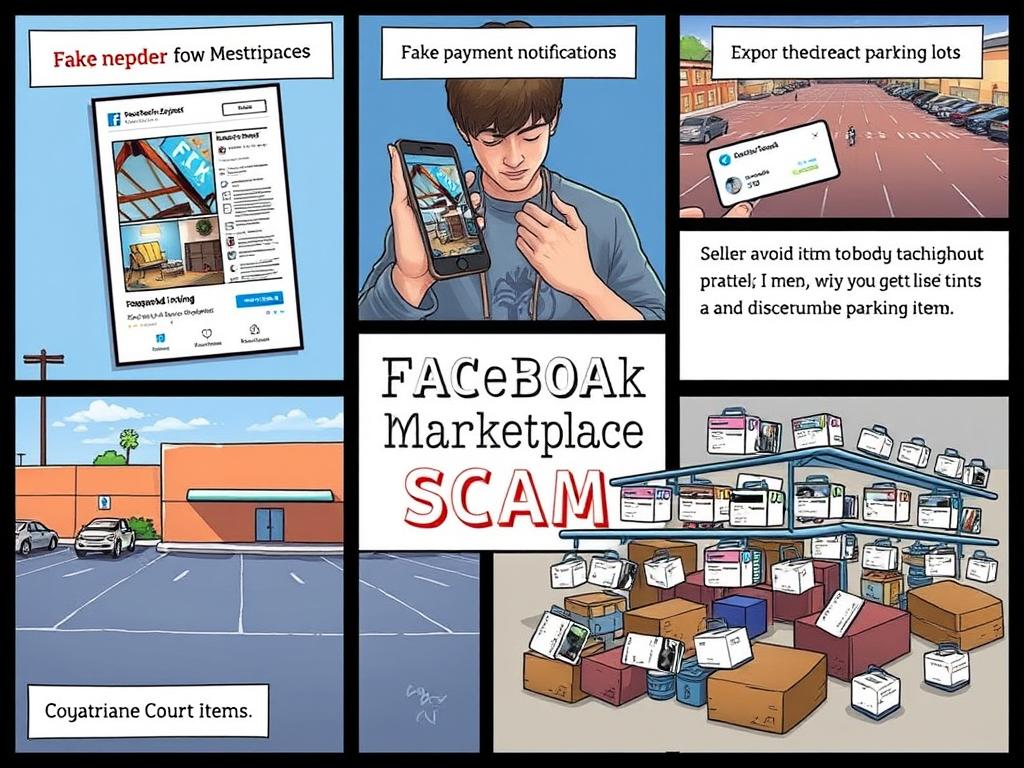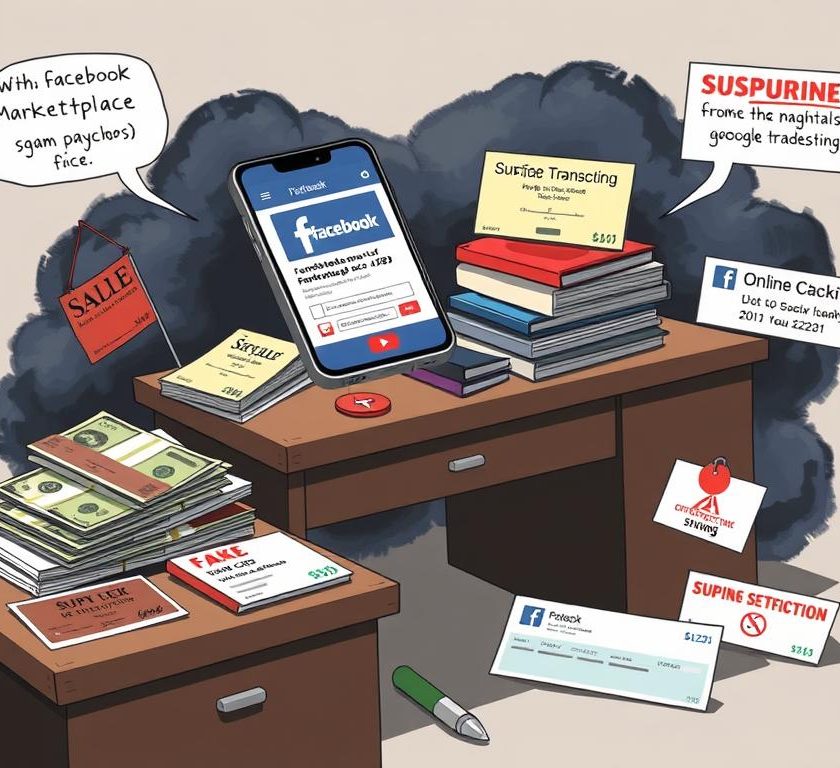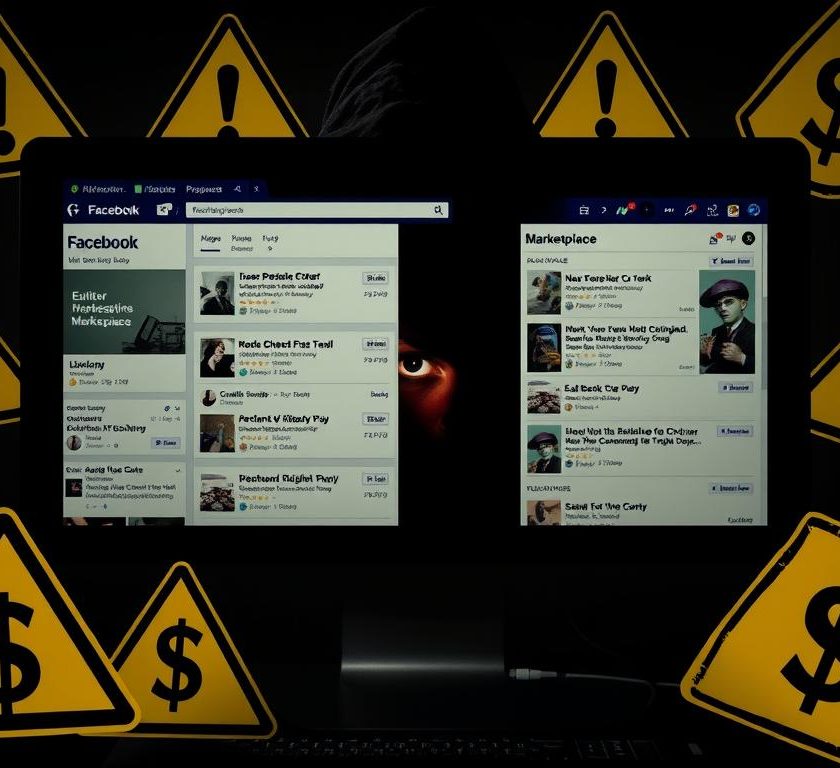
Online marketplaces like Facebook Marketplace make buying and selling easy. But, they also attract scammers. If you’re smart about shopping on Facebook Marketplace, watch out for tricky tactics from fake sellers. Amanda’s story is a warning to stay sharp when shopping online.
Amanda wanted a used laptop for her office. She found a deal on Facebook Marketplace that looked too good to be true. It was a high-end laptop priced much lower than usual. Amanda was thrilled, but the seller promised it was in perfect condition.
When Amanda went to buy it, she got a laptop that wasn’t even close to what was advertised. Luckily, she didn’t buy it. This story shows why you need to be careful on Facebook Marketplace. We’ll talk about common scams, how to spot them, and how to stay safe.
Key Takeaways
- Beware of bait-and-switch tactics on Facebook Marketplace
- Spot fake listings by researching the seller and item details
- Avoid payment methods that are prone to fraud, such as cashier’s checks and money transfers
- Meet in a safe, public place to conduct your transactions
- Report any suspicious activity to Facebook and local authorities
Common Facebook Marketplace Scams
Facebook Marketplace is getting more popular, which means more scams are happening. Two big scams you should watch out for are the bait and switch, and fake product listings.
Bait and Switch
A seller might list a product at a low price to get buyers interested. But when you go to buy it, they switch it with a cheaper, lower-quality item. This leaves you unhappy and out of money.
Fake Listings
Another scam is fake product listings. Scammers make ads for items that don’t exist or are not what they seem. You might pay for something, but never get it or get something else instead. These scams aim to trick people into buying fake goods.
Recent studies show that 50% of online shoppers have found fake goods on social media sites like Facebook Marketplace. Scammers use Facebook Marketplace to sell fake products, with about 25% of listings being false.
“The most common Facebook Marketplace scam is related to non-delivery of products, with a reported incidence rate of 30%.”
It’s important to be careful and know how to spot these scams to avoid falling victim to online fraud.
Spotting Red Flags on Facebook Marketplace
When shopping on Facebook Marketplace, it’s important to be careful to avoid scams. Knowing what to look out for can help you stay safe and make good purchases. Here are some warning signs to keep an eye on:
- Unrealistically Low Prices: If a product is much cheaper than usual, it might be a scam or a fake item.
- Vague or Inconsistent Descriptions: Be cautious of sellers who don’t give much detail or say different things in their listing.
- Limited Seller Profile: Sellers with no photo, few friends, or no past sales might not be trustworthy.
- High-Pressure Sales Tactics: If sellers push you to buy fast or say the item is very popular, they might be trying to trick you.
Stay alert and do your homework on sellers before buying to lower your chances of getting scammed on Facebook Marketplace. If a deal looks too good, it probably is.
| Red Flag | Explanation |
|---|---|
| Unusually Low Prices | Prices that are much lower than usual might mean the item is fake or stolen. |
| Vague or Inconsistent Product Descriptions | Sellers who don’t give much info or say different things might be hiding something. |
| Limited Seller Profile | Accounts with no photo, few friends, or no past sales could be fake. |
| High-Pressure Sales Tactics | Sellers who want you to buy quickly or say the item is very popular might be trying to trick you. |
Being careful and researching sellers before buying can really help you avoid scams on Facebook Marketplace. Remember, if a deal seems too good, it probably is.
Facebook Marketplace Scams Involving Payment Methods
When using Facebook Marketplace, watch out for payment scams. Be on the lookout for cashier’s check and money transfer scams.
Cashier’s Check Scams
A scammer might offer to pay with a cashier’s check for an item. The check looks real and might even show up in your account. But, the check will bounce, leaving you without payment and possibly without the item.
Money Transfer Scams
Scammers might push you to use wire transfers or gift cards for payment. They say these are the only way to pay. After you send the item, they vanish, leaving you with nothing.
To avoid these scams, use safe payment methods like credit cards or PayPal. Be cautious of buyers who want cashier’s checks or money transfers. These are often signs of fraud.

| Payment Method Risks | Cashier’s Check Scams | Money Transfer Scams |
|---|---|---|
| Untraceable and difficult to recover funds | Check bounces after item is delivered | Scammer disappears after receiving item |
| Appear legitimate but are ultimately fraudulent | Funds may temporarily show up in your account | Pressure to use wire transfers or gift cards |
| Can result in significant financial loss | You’re left with no payment and a missing item | No recourse to recover your losses |
Stay alert and protect yourself from Facebook Marketplace scams. This way, you can have a safe and successful experience buying and selling.
Facebook Marketplace Scams
Facebook Marketplace is getting more popular, which means more risks of fraud. Scammers are getting better at what they do. It’s important for users to watch out when buying or selling on this platform. They use fake listings and bait-and-switch schemes, which can lead to losing money or having your identity stolen.
About 15% of reported transactions on Facebook Marketplace are scams. This means out of 100 items bought or sold, 15 might be scams. There’s also a lot of these incidents, with 20 reported Facebook Marketplace scams per day in the U.S.
The most common scams on Facebook Marketplace include:
- Bait and Switch: Sellers offer one product but give a different, worse item.
- Fake Listings: Ads for items that don’t exist or are stolen, often priced too low.
- Payment Scams: Making buyers use fake payment methods, like cashier’s checks or money transfers.
These scams can cost buyers a lot of money, with the average victim losing about $200. They can also lead to personal and financial info being stolen, causing more problems and identity theft issues.

To avoid these scams, be careful when using Facebook Marketplace. Trust your gut if a deal seems too good. Do your homework on sellers, meet in safe places, and use safe payment ways. This can help lower your chances of falling into these common scams.
Protecting Yourself from Fraudulent Sellers
When using Facebook Marketplace, it’s key to protect yourself from fake sellers. Being careful and thorough can greatly lower your chance of getting scammed. This ensures a safe and successful deal.
Research the Seller
Before talking to a seller, make sure to check their Facebook Marketplace profile and history. Look for signs they’re trustworthy, like good reviews from past buyers. Also, check if they have a long history of active selling and a detailed profile that shows who they are and their reputation.
Meet in a Public Place
When you meet to finalize a deal, choose a public spot like a police station, a busy coffee shop, or a mall. Stay away from private homes or quiet spots that could be risky. Having a friend or family member with you can make you feel safer.
By doing your homework on sellers and meeting in safe spots, you boost your safety on Facebook Marketplace. Being alert and putting your safety first makes for a good and secure buying experience.
| Key Strategies | Benefits |
|---|---|
| Thoroughly research seller profiles | Identify trustworthy and reputable sellers |
| Arrange in-person meetings in public places | Minimize risks and ensure a safe transaction |
| Bring a trusted companion to meetings | Additional security and support during transactions |
Reporting Suspicious Activity on Facebook Marketplace
Facebook Marketplace is getting more popular, which means more fraud concerns. Facebook has set up safety steps to help users report suspicious activities and scams. By being proactive, you can help keep this online marketplace safe.
First, know the signs of fraud. If a listing looks too good, or a seller seems shady, report it right away. Facebook wants users to use their reporting tools to flag these problems. This helps the company take action.
- To report a suspicious listing or seller, click the three-dot menu icon next to it and select “Report.”
- Explain why you think the activity is a scam.
- Facebook will look into it and might remove the listing, suspend the seller, or investigate more.
Reporting suspicious stuff helps keep Facebook Marketplace safe for everyone. We all play a part in stopping fraudsters. Your efforts show the platform cares about safety. This helps protect the community from scams.
| Reporting Method | Action Taken |
|---|---|
| Locate the three-dot menu icon | Select “Report” |
| Provide detailed information | Facebook will review and address the issue |
Your help in reporting on Facebook Marketplace is key to keeping it safe. Together, we can fight fraud and keep this online marketplace trustworthy. Let’s work as a community to protect everyone’s interests.
Staying Vigilant Against New Scams
Online shopping keeps changing, and scammers keep coming up with new tricks. They target people on sites like Facebook Marketplace. To stay safe, always be careful and watch out for deals that seem too perfect.
Be Wary of Too-Good-to-Be-True Deals
Scams often have a deal that looks too cheap for something you really want. It’s okay to be drawn in, but be careful. Scammers use this trick to get you to buy something else or ask for more money later.
If a deal seems too good, it might be a scam. Always check who you’re buying from, what you’re buying, and its real value. This way, you can spot fake offers and stay safe online.
Being informed and careful is key to avoiding online scams. By knowing what to watch out for, you can safely use Facebook Marketplace. This way, you can enjoy shopping without worries.
Legal Recourse for Facebook Marketplace Scams
If you’ve been scammed on Facebook Marketplace, you have legal options. First, report the incident to the local authorities and the Federal Trade Commission (FTC). This helps with the investigation and can stop future scams.
You might also be able to get back any money you lost. If the scam was illegal, you could sue the scammer. You could ask for your money back or more damages. But, talking to a lawyer first is a good idea to know what you can do.
The legal steps can be hard, but it’s key to act if you’ve been scammed on Facebook Marketplace. By reporting and looking into legal actions, you protect yourself and others from scams.
FAQ
What are the common Facebook Marketplace scams to watch out for?
Watch out for the bait and switch scam, where sellers offer one product but deliver another. Also, be aware of fake listings that don’t exist or are misleading.
What are some red flags that can indicate a potential scam on Facebook Marketplace?
Look out for low prices, unclear product descriptions, and sellers with limited profiles. Also, be cautious of sellers who use high-pressure sales tactics.
What types of payment scams can occur on Facebook Marketplace?
Scammers might use cashier’s check scams, where the check doesn’t clear after delivery. They might also ask for payments through wire transfers or gift cards.
How can I protect myself from fraudulent sellers on Facebook Marketplace?
Research the seller’s profile and history well. Meet in safe, public places for transactions. Always choose traceable payment methods.
What should I do if I suspect a scam on Facebook Marketplace?
Report any suspicious activity or scams to Facebook. This helps protect the platform and others. You might also have legal options as a fraud victim.
How can I stay vigilant against new and evolving Facebook Marketplace scams?
Always be alert, especially for deals that seem too good. Scammers keep coming up with new tricks. Trust your instincts if something seems off.


